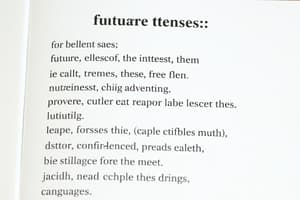Podcast
Questions and Answers
Which future tense is used to describe actions that will be in progress at a specific time in the future?
Which future tense is used to describe actions that will be in progress at a specific time in the future?
- Future Perfect
- Present Continuous
- Future Simple
- Future Continuous (correct)
The future simple tense is formed using 'will be' + the present participle (-ing form) of the verb.
The future simple tense is formed using 'will be' + the present participle (-ing form) of the verb.
False (B)
What auxiliary verb is commonly used with the future simple tense to express spontaneous decisions or predictions?
What auxiliary verb is commonly used with the future simple tense to express spontaneous decisions or predictions?
will
The future _______ tense is used to describe actions that will be completed before a specific time in the future.
The future _______ tense is used to describe actions that will be completed before a specific time in the future.
Match the future tenses with their primary function:
Match the future tenses with their primary function:
Which of the following sentences is an example of the Future Continuous tense?
Which of the following sentences is an example of the Future Continuous tense?
The phrase 'be going to' is typically used for spontaneous decisions, similar to 'will'.
The phrase 'be going to' is typically used for spontaneous decisions, similar to 'will'.
What is the correct form for the past participle used in the Future Perfect tense?
What is the correct form for the past participle used in the Future Perfect tense?
By the time we arrive, they _______ already eaten (future perfect).
By the time we arrive, they _______ already eaten (future perfect).
Which of these time expressions is most commonly used with the Future Perfect tense?
Which of these time expressions is most commonly used with the Future Perfect tense?
Using the incorrect verb form is not a common mistake when using future tenses.
Using the incorrect verb form is not a common mistake when using future tenses.
Give an example of a sentence using the future simple tense to express a planned action.
Give an example of a sentence using the future simple tense to express a planned action.
She _______ a new car next month (future simple).
She _______ a new car next month (future simple).
In what context would you typically use the Future Continuous tense?
In what context would you typically use the Future Continuous tense?
The Future Perfect tense is used to express predictions about events that might happen in the future.
The Future Perfect tense is used to express predictions about events that might happen in the future.
What is the function of time expressions when using future tenses?
What is the function of time expressions when using future tenses?
I _______ you later (future simple).
I _______ you later (future simple).
Which sentence correctly uses the Future Perfect tense?
Which sentence correctly uses the Future Perfect tense?
Neglecting time expressions does not impact the clarity of future tense sentences.
Neglecting time expressions does not impact the clarity of future tense sentences.
Give an example of a sentence using the Future Continuous tense.
Give an example of a sentence using the Future Continuous tense.
They _______ the game tonight (future continuous).
They _______ the game tonight (future continuous).
What is the primary difference between 'will' and 'be going to' in the future simple tense?
What is the primary difference between 'will' and 'be going to' in the future simple tense?
The future continuous tense can be used to express regret about events that will not happen.
The future continuous tense can be used to express regret about events that will not happen.
Provide a future perfect sentence, including a time expression.
Provide a future perfect sentence, including a time expression.
I _______ my work by tomorrow (future perfect).
I _______ my work by tomorrow (future perfect).
Which of the following sentences uses the correct structure for the Future Continuous tense?
Which of the following sentences uses the correct structure for the Future Continuous tense?
The future simple tense is only used for planned actions.
The future simple tense is only used for planned actions.
How would you express an intention to travel next year using the future simple tense?
How would you express an intention to travel next year using the future simple tense?
They _______ at 6 PM (future simple).
They _______ at 6 PM (future simple).
Which tense is appropriate for describing an action that will be completed before 2025?
Which tense is appropriate for describing an action that will be completed before 2025?
The future perfect can be used to describe an action that is currently happening
The future perfect can be used to describe an action that is currently happening
Describe the function of the future continuous tense.
Describe the function of the future continuous tense.
I _________ dinner at 7pm. (future continuous)
I _________ dinner at 7pm. (future continuous)
Match the future tense with the time expression
Match the future tense with the time expression
Which option demonstrates future perfect?
Which option demonstrates future perfect?
We will eat dinner later is considered future continuous.
We will eat dinner later is considered future continuous.
What does future tense generally indicate?
What does future tense generally indicate?
We _________ to Europe next year (future simple).
We _________ to Europe next year (future simple).
Which sentence most appropriately expresses a prediction?
Which sentence most appropriately expresses a prediction?
The expression will is suited for planned activities.
The expression will is suited for planned activities.
Which future tense is best suited to describe an action that will be in progress at a specific time in the future?
Which future tense is best suited to describe an action that will be in progress at a specific time in the future?
The future simple tense, formed with 'will' + base verb, is typically used for planned actions or intentions.
The future simple tense, formed with 'will' + base verb, is typically used for planned actions or intentions.
Provide an example sentence using the future perfect tense to describe an action that will be completed before a meeting tomorrow.
Provide an example sentence using the future perfect tense to describe an action that will be completed before a meeting tomorrow.
She __________ (travel) to Japan next year. (Fill in the blank with the correct form of the future simple tense).
She __________ (travel) to Japan next year. (Fill in the blank with the correct form of the future simple tense).
Match each future tense with its primary use:
Match each future tense with its primary use:
Flashcards
Future Tenses
Future Tenses
Actions that will occur in the future.
Future Simple
Future Simple
Used for actions that will occur in the future, formed with 'will' + base verb or 'be going to' + base verb.
Future Simple Usage
Future Simple Usage
Expresses a general prediction about the future, without a specific timeframe other than after the present.
Future Continuous
Future Continuous
Signup and view all the flashcards
Future Continuous Timing
Future Continuous Timing
Signup and view all the flashcards
Future Perfect Use Case
Future Perfect Use Case
Signup and view all the flashcards
Future Perfect
Future Perfect
Signup and view all the flashcards
Future Perfect Timing
Future Perfect Timing
Signup and view all the flashcards
Future Tense Differences
Future Tense Differences
Signup and view all the flashcards
Future Time Expressions
Future Time Expressions
Signup and view all the flashcards
Will vs. Be Going To
Will vs. Be Going To
Signup and view all the flashcards
Correct Verb Forms
Correct Verb Forms
Signup and view all the flashcards
Importance of Time Expressions
Importance of Time Expressions
Signup and view all the flashcards
Study Notes
- Future tenses indicate actions that will happen in the future
Future Simple
- Expresses actions that will occur in the future
- Formed using "will" + base form of the verb or "be going to" + base form of the verb
- "Will" is often used for spontaneous decisions, predictions, or promises
- "Be going to" is used for planned actions or intentions
- Expresses a general prediction about the future, without a specific timeframe other than it being after the present
- Examples with "will":
- I will travel to Europe next year
- They will arrive at 6 PM
- Examples with "be going to":
- We are going to visit my family
- She is going to start a new job
Future Continuous
- Describes actions that will be in progress at a specific time in the future
- Formed using "will be" + present participle (-ing form) of the verb
- Indicates an ongoing action at a particular point in time
- Use it to describe an action that will be happening at a specific time in the future
- Use it to predict or speculate about future events that are already planned or part of a routine
- Use it to ask politely about someone's plans
- Examples:
- I will be working at 9 AM tomorrow
- They will be eating dinner when we arrive
- Describes an event in progress at a specific future time, overlapping with another event or time
Future Perfect
- Describes actions that will be completed before a specific time in the future
- Formed using "will have" + past participle of the verb
- Indicates that an action will be finished before another point in the future
- Use it to express the completion of an action before a specific point in the future
- Use it to speculate or make predictions about past events
- Use it to express regret about events that will not happen
- Examples:
- I will have finished my work by tomorrow
- They will have left by the time we get there
- Describes the completion of an event at a specific future time, potentially overlapping with another event or time
Differences and Usage
- Future simple expresses a general future action or prediction
- Future continuous expresses an action in progress at a specific future time
- Future perfect expresses an action completed before a specific future time
- Choosing the correct tense depends on the specific context and the speaker's intended meaning
Time Expressions
- Often used with future time expressions to specify when the action will take place
- Examples for future simple: tomorrow, next week, in the future, soon
- Examples for future continuous: at 5 PM, all day tomorrow, during the meeting
- Examples for future perfect: by next year, before 2025, by the time you arrive
Practice Examples
- Future Simple:
- I will call you later
- She is going to buy a new car next month
- Future Continuous:
- He will be studying at the library tomorrow afternoon
- They will be watching the game tonight
- Future Perfect:
- By the time we arrive, they will have already eaten
- I will have completed the project by Friday
Common Mistakes
- Confusing "will" and "be going to"
- "Will" is often used for spontaneous decisions, while "be going to" is used for planned actions
- Incorrect use of verb forms
- Ensure the correct base form, present participle, or past participle is used with each tense
- Neglecting time expressions
- Include time expressions to provide context and clarity
Studying That Suits You
Use AI to generate personalized quizzes and flashcards to suit your learning preferences.




